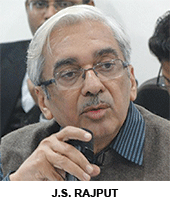 According to Arthur Wellesley (1769-1852), better known as the Duke of Wellington, “the Battle of Waterloo (1815) was won on the playing fields of Eton,” the famous British public school (estb.1440).
According to Arthur Wellesley (1769-1852), better known as the Duke of Wellington, “the Battle of Waterloo (1815) was won on the playing fields of Eton,” the famous British public school (estb.1440).
The achievements of badminton star P.V. Sindhu, wrestler Sakshi Malik and gymnast Dipa Karmakar in the XXXI Olympic Games staged in Rio de Janeiro (Brazil) in July, galvanised a morose and disheartened nation. Malik challenged social taboos and made a stupendous contribution in the area of gender equality in Haryana, a state which is waging a losing battle against rampant female foeticide. Like India’s legendary sprints athlete the great Milkha Singh, who didn’t win an Olympic medal, Dipa Karmakar nevertheless made her country proud with her sheer persistence, grit, commitment and self-confidence.
However, the achievements of these few Olympic stars cannot obscure the stark reality that the overall performance of our athletes and players — the largest Indian contingent ever sent to the Olympic Games — was disappointing. This wasn’t unexpected as neglect of sports and games in the all-important school years is pervasive in Indian education. Moreover, sports associations and boards, which administer athletics and field sports, have become the personal fiefdoms of politicians and career administrators. Clearly, with over 100,000 single-teacher schools countrywide and 30 percent of the nation’s 1.40 million schools lacking access to playgrounds, it’s naive to expect a culture of sports and games to have evolved in post-independence India.
Teacher education institutions — including those offering specialisation in physical education — accord little importance to practical training and participation in track and field events, and are content to teach theory. They seem to be unaware that success in highly competitive international sports and games arenas demands discipline and dedication, willingness to learn and practice for long hours, and cooperation with coaches and other players. Action on playing fields and in sports arenas develops mental strength and determination and this action must begin in all schools countrywide.
However, India’s educators — principals, trustees and teachers — need to become aware that there’s more to sports education than mere technical expertise and practice. Qualities of head and heart, teamwork and building the spirit of sportsmanship and magnanimity are also important for developing a sports culture in the country’s schools and colleges.
Yogeshwar Dutt, who won a bronze in the 60 kg freestyle wrestling competition at the London Olympics (2012), should have been overjoyed to learn that his bronze medal was upgraded to silver which had been awarded to Russia’s Besik Kudukhov, after the latter was disqualified on technical grounds much after the closure of the games. But, rather than subject Kudukhov’s family to the ignominy of withdrawal of the silver medal posthumously, Dutt declined to accept it. This magnanimous gesture was Dutt’s graceful tribute to the deceased four-time world champion and two-time Olympic medalist. One wishes every school headmaster and vice chancellor would bring Dutt’s magnanimity and sheer humanity to the attention of every learner.
An example illustrative of the pervasive indifference to sports education and talent in India’s schools and colleges, is narrated by All-England badminton champion Pullela Gopichand, who wrote the tough IIT-JEE exam and failed. Meanwhile, his brother, who was a better player and an Andhra Pradesh state badminton champion, cleared IIT-JEE. But despite being aware that the AP state badminton champion was a student, IIT-Madras did nothing to promote his talent, with the result that Gopichand, who focused on his badminton, developed into a national and All-England champion, while his brother faded away.
Parental push, coaching, competition and excessive focus on academics is crushing the talent of potential sports champions on a massive scale across the country. In addition, boards and associations chartered to encourage and develop athletics and field games, are dominated by vested interests with total disregard for transparency. These associations should be headed by genuine sportspersons and not become the private playing fields of politicians and bureaucrats. Sports associations need to be governed by sportspersons with good track records, and politicians shouldn’t be permitted to impede the evolution of a culture of sports and games in India’s schools and universities.
Therefore, the first step required is to give facilities and dignity to physical education teachers and coaches. The second is to award marks for sports participation and achievement. In this connection, it’s encouraging to learn that the prime minister has constituted a policy formulation council for strategic planning for the next three Olympic games. Hopefully, it will bring about an attitudinal transformation in parents, teachers and educationists and prompt them — even if belatedly — to accord sports education the same importance as academics.
(J.S. Rajput is former director of NCERT and NCTE)





















